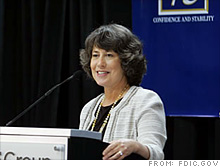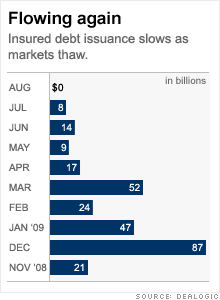Kicking the bailout habit
The FDIC wants banks to stand on their own two feet, but withdrawing insurance on big checking accounts won't be popular.
 |
| FDIC chief Sheila Bair wants to get out of the bailout business. But is now the time? |

NEW YORK (Fortune) -- Washington gets another chance to kick the bailout habit this week, when regulators consider the fate of a subsidy that has been good to smaller banks.
The board of the Federal Deposit Insurance Corp. is scheduled to meet Wednesday. On the agenda is the status of the Transaction Account Guarantee Program, which provides unlimited federal insurance for noninterest-bearing checking accounts -- those used by businesses and governments for meeting payroll, for instance.
The so-called TAG program covers some $700 billion in deposits that would otherwise be uninsured. For small banks, it's been a big boost, giving them access to cheap funding via low-cost deposits.
The FDIC has proposed either to wind the program down on schedule at year-end, or to extend it for six months while more than doubling the fees levied on subscribing banks.
The decision comes as policymakers face pressure to pare back costly programs they put in place after the collapse of Lehman Brothers.
A decision to allow TAG to expire on schedule would send another signal the banks are strong enough to stand on their own two feet. Last month, regulators scored a modest victory on this front when CIT (CIT, Fortune 500) -- a struggling lender to small businesses -- got a private loan after a bid for federal aid was rejected.
Still, many smaller banks are urging the agency to extend the TAG program into next year or beyond. They say the economy is still weak and the financial system wobbly. Without TAG, they say they will have trouble competing against big institutions, including teetering titans Citi (C, Fortune 500) and Bank of America (BAC, Fortune 500).
"The TAG program ensures that community banks are not at a competitive disadvantage in this fragile economy," the Independent Community Bankers Association wrote in a July 30 letter to the FDIC. "The safety of transaction accounts continues to be one of the most important concerns for customers, which too-big-to-fail institutions can provide since the public perceives that those institutions will ultimately be bailed out if they become financially unstable."
Extending the program and raising the fees to banks makes sense to Derek Williams, CEO of First Peoples Bank in Pine Mountain, Ga. He said banks should expect to pay for insurance on big deposits -- though he and other bankers say the increased fees should be graduated, based on the risks insured banks pose to the program.
Williams adds that the transaction guarantee program is useful because private insurers have fled the deposit market over the past year. When the program ends, he said, community banks such as his could be hard pressed to insure big deposits from government entities.
That could force municipalities to shop for new bankers -- and leave the community banks short of lendable funds to support the recovery.
"We've had a big increase in public deposits, and those need to be covered," said Williams. "You don't ever want to be in a position as a banker where you have to turn away deposits, but that's what we could be looking at."
The debate comes as sunset approaches for a more visible subsidy. FDIC officials have said that they would like the Transaction Liquidity Guarantee Program, which allows big financial firms to borrow in the markets with the backing of the government, to expire as planned Oct. 31.
The TLGP seems to be playing out as policymakers might want, with debt issuance dropping sharply as markets resume functioning.
Big finance companies such as Goldman Sachs (GS, Fortune 500), General Electric (GE, Fortune 500) and JPMorgan Chase (JPM, Fortune 500) issued tens of billions of dollars of FDIC-backed debt between November and March, at a time when debt markets were mostly closed to bonds that weren't backed by governments.
But since then, markets have improved and the stigma associated with government backing has increased, prompting borrowers to move most of their fundraising outside the FDIC guarantee program. August has yet to see an FDIC-backed bond issue, according to Dealogic.
In addition, the FDIC has yet to record any losses from TLGP. It has taken in $8.6 billion in fees from debt-issuing banks.
By contrast, the TAG program -- which is technically part of the TLGP -- was about $140 million in the hole as of June, due in large part to the failure that month of Atlanta correspondent bank Silverton. ![]()
-
 The retail giant tops the Fortune 500 for the second year in a row. Who else made the list? More
The retail giant tops the Fortune 500 for the second year in a row. Who else made the list? More -
 This group of companies is all about social networking to connect with their customers. More
This group of companies is all about social networking to connect with their customers. More -
 The fight over the cholesterol medication is keeping a generic version from hitting the market. More
The fight over the cholesterol medication is keeping a generic version from hitting the market. More -
 Bin Laden may be dead, but the terrorist group he led doesn't need his money. More
Bin Laden may be dead, but the terrorist group he led doesn't need his money. More -
 U.S. real estate might be a mess, but in other parts of the world, home prices are jumping. More
U.S. real estate might be a mess, but in other parts of the world, home prices are jumping. More -
 Libya's output is a fraction of global production, but it's crucial to the nation's economy. More
Libya's output is a fraction of global production, but it's crucial to the nation's economy. More -
 Once rates start to rise, things could get ugly fast for our neighbors to the north. More
Once rates start to rise, things could get ugly fast for our neighbors to the north. More







